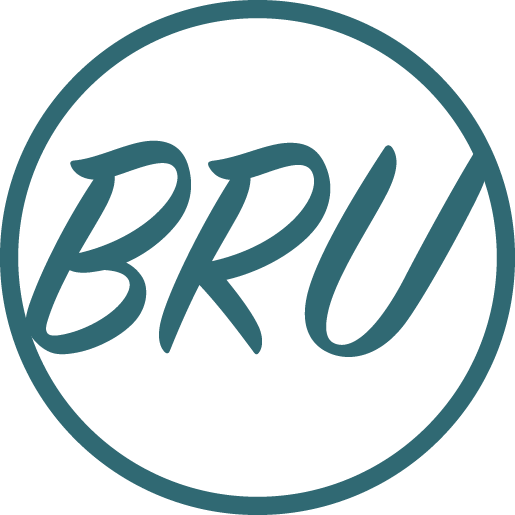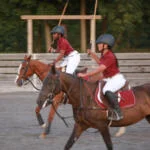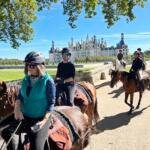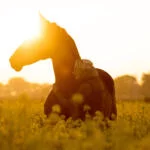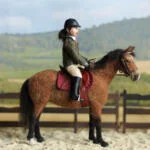Like many horse-crazy kids, Megan Smith didn’t have the opportunity to take horseback riding lessons during her childhood. However, when she still had the desire to learn in her thirties, she decided to do something about it.
We spoke with Megan about what it’s like to start riding as an adult, her interest in equine massage and acupressure, and the benefits of pursuing a life-long dream, even if it comes later than expected.
This interview has been edited for length and clarity.
BRU: When did you first become interested in horses?
MS: When I was a little girl. My grandpa had horses, so I got to ride his mare a little bit when we visited, but only if the weather was just right and we had nothing else to do. (laughs) His horse was a saint. I appreciate her much more now than I did then.
But, my mom was terrified of horses. She was around them her whole life, and my grandpa tried so hard to get her to like them, but she was not at all interested. So, horses were not something my parents were enthusiastic about me pursuing.
When I was ten, I saved all of my allowance in my Breyer box to buy a horse, but my parents never caved to my requests, and eventually, I let the idea go.
BRU: When did you decide you still wanted to learn?
MS: I was in my thirties, and I finally realized, “Oh, I have my own money. I can do what I want.” So, I called a college friend who’s a Western trainer and asked if she knew anyone offering English adult beginner lessons, and she recommended my current trainer. Several people were very kind and offered to let me come ride, but I needed something more consistent, and for some reason, I wanted to jump.
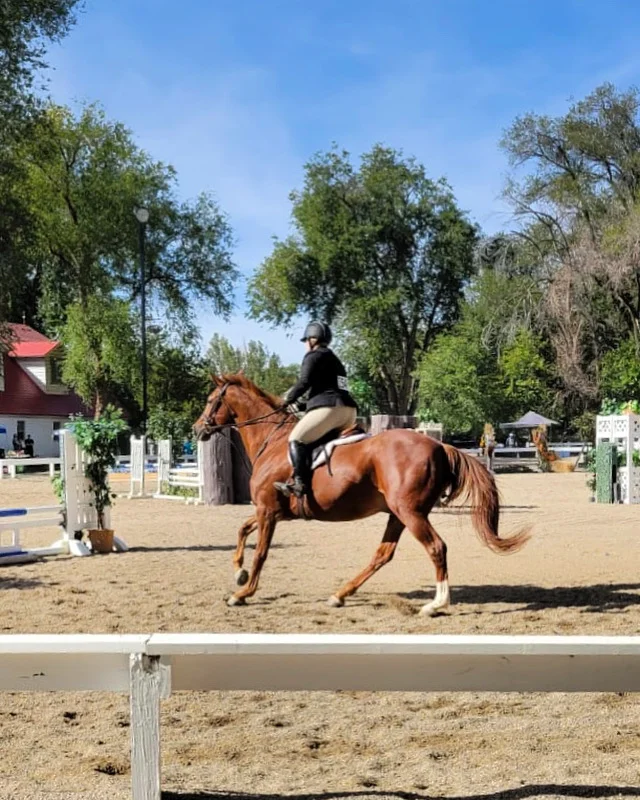
BRU: Are there any early lessons or experiences that stand out to you now?
MS: When I arrived at my first lesson, I could walk, trot, and canter a little bit, so my trainer put me on a horse named Indy who was wonderful but didn’t like being in the crossties. And I had no idea what I was doing, so he made me very nervous. But as soon as I got on, I was like, “Oh, we’ll be fine—everything will be fine.”
I also rode a horse named Larry, who was the first horse I ever jumped. He was exactly what I needed because he would do his job every single time no matter what I did wrong. He would ignore how nervous I was and say, “No, no, it’s fine. We’re just going to trot over this jump.”
BRU: Have you noticed any major pros or cons to learning the basics as an adult?
MS: One of the biggest pros is that—since it’s all new to me—any progress I make is fun and motivating.
As an adult, time feels a little bit more precious. When I decided that riding was how I wanted to spend my time and money, I became fully invested in learning. There are probably things I comprehend now better than I would have as a kid.
But sometimes it’s scary. There are times I wish I’d done this when I was a kid and not so afraid of everything. When I was a kid, I didn’t realize how breakable I am. I’ve had to work through a lot of nerves, but that’s probably true for everyone to some extent.
It’s also taken me a while to develop a sense of feel. For a long time when my trainer would ask if I could feel something my horse was doing, my response was, “No, but I believe you!” This past year, when she asks if I can feel something specific, I actually can!
BRU: When you started as an adult, did you still hope to own a horse?
MS: That was always the goal. My horse, Dublin, started as a lease because I was nervous about the commitment of ownership. But of course, we fell in love, and I was like, “Please don’t take him away from me!” It was super exciting as an adult to realize, “Oh, I can actually do this!”
I feel like I won the lottery with Dublin. He’s so forgiving. He’ll let me know when I’m doing things wrong, but he never holds a grudge about what happened the day before. If I do something mostly right, he’ll do it right. But, he’s got enough opinions and spiciness that I’ve learned a lot from him.
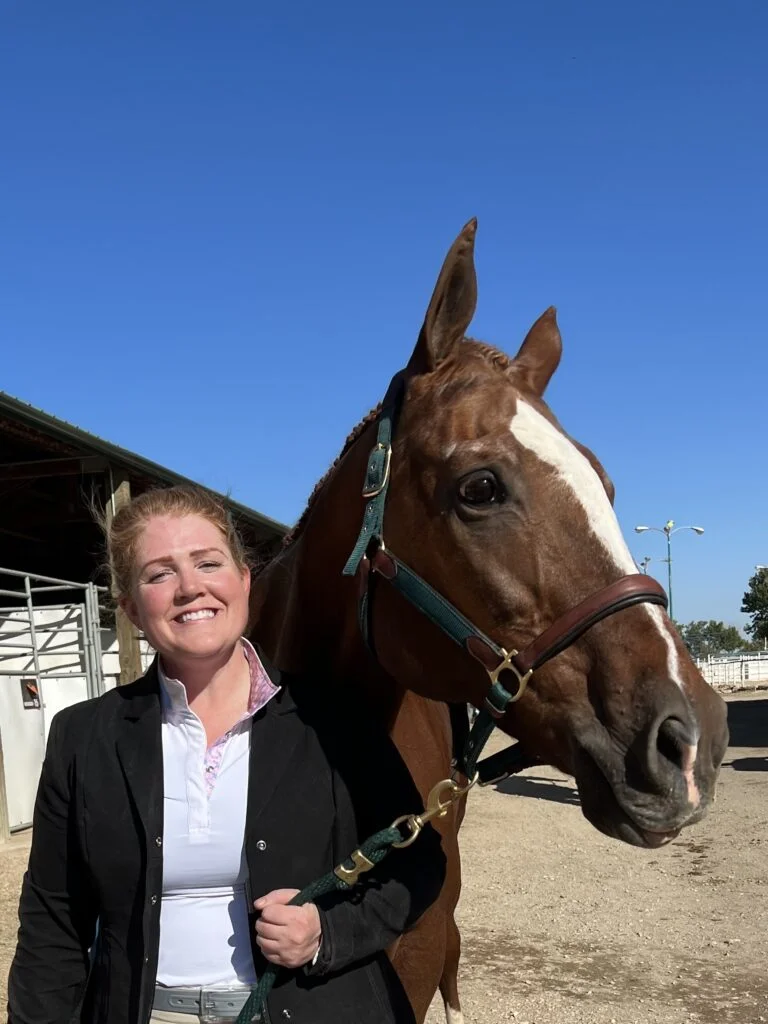
BRU: Has your horse community made a positive impact on your life?
MS: I’ve met some of my very best friends at the barn. It’s hard to make friends as an adult sometimes, so it’s really special to find other people who are willing to sit around and talk about horses for hours at a time. And then, it’s wonderful to become friends with these people outside of the barn and figure out all the other things we have in common.
BRU: What are your favorite things about riding?
MS: When I’m stressed or worried, I can go to the barn, and it’s such a nice break. It has meditative qualities. I’m not a good enough rider that I can think about my to-do list while I’m riding. I have to focus, and it requires me to be connected to my body and aware of where I am and what I’m doing.
BRU: What are the hardest parts of your riding journey?
MS: The hardest part is when I’m struggling to do something right and I feel like I’m not good enough for my horse. I think the world of him, and I think he deserves the world. He’s been so patient to let me learn with him.
BRU: When did you get involved with equine massage and acupressure, and what do you like about it?
MS: I got involved two years ago and attended school in Colorado to become certified. My main motivation was to help my horse. He’s about 28, so he gets a lot of care to keep him comfortable and healthy.
Learning about massage and acupressure has increased my awareness of equine body language because it’s important to read a horse’s reaction. If you touch on a tender spot, some horses will tell you immediately, and some of them are much more subtle about it.
It’s rewarding to help a horse release a tight muscle or see improvements in their comfort over time. When I work on my horse, it’s nice to spend that bonding time with him on the ground.
BRU: Do you have any specific goals this year or in the long run?
MS: My goal this year is to have fun. Dublin’s older, so I’ll never push his body by moving him up a level, even though he used to jump higher. I plan to see what he wants to do and whether he’s feeling good and just roll with it. I’d like to move up the levels at some point in my life, but I have no time limit on that.
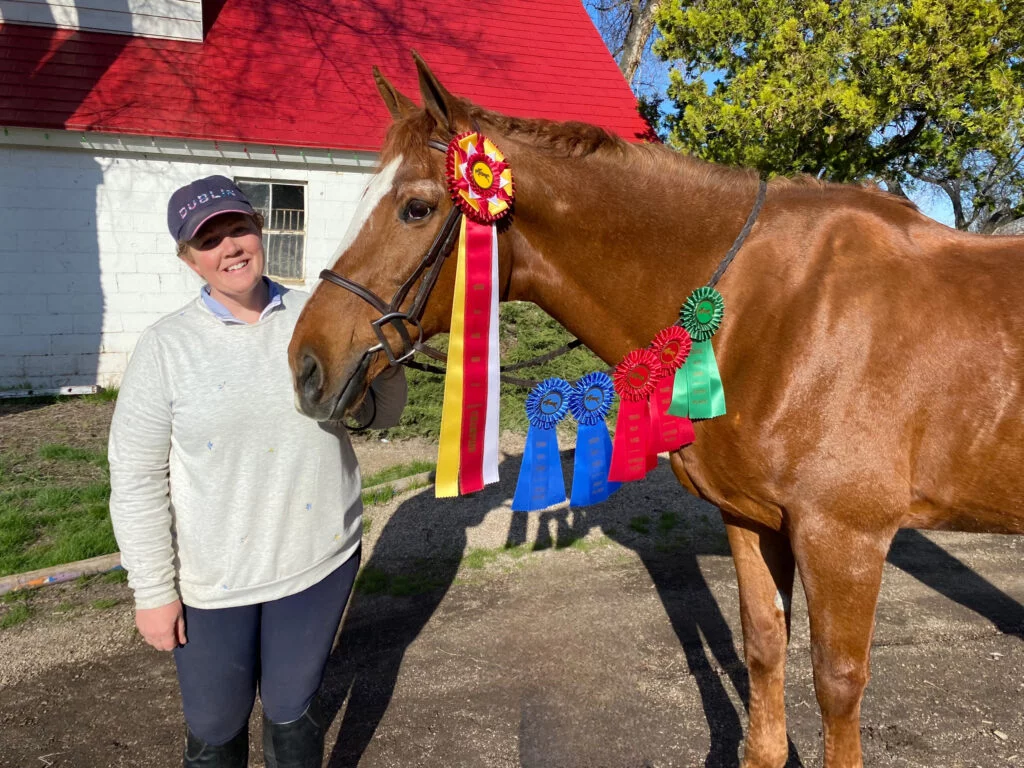
BRU: What have horses taught you?
MS: They’ve taught me a lot! (laughs) Horses teach you humility. I’ve been riding for six years now. At times I’ve been like, “I’m so confident!” And then suddenly I feel like I can’t ride correctly at all for six months.
Horses teach you how to be a leader and be kind. My trainer talks about how you can’t get into a tug of war with a horse because you’ll lose. They’re 1100 pounds—you’re not going to win by bullying them into things.
My horse is also pretty spooky, so if I’m nervous, he’s nervous. I can’t force things. I have to build trust and be a reliable leader. In a weird way, that translates to the rest of my life.
BRU: Why do you think being around horses is beneficial?
MS: Horses are phenomenal for mental health. I understand they’re not helpful for everyone, especially for someone like my mother, and that’s fine! But so many people can benefit from them.
Being around horses also teaches resilience, which is vital in the world today, when it feels like anything can happen at any minute. Horses are living animals, and they’re not always predictable. Your confidence grows when you realize that unexpected things will happen sometimes, but you can still figure things out and handle difficult situations.
BRU: What would you say to someone who is considering taking beginner adult riding lessons?
MS: I would say absolutely do it! Find a trainer you trust, ask lots of questions, and trust the process. It’s so worth it!
To learn more about Megan’s work in equine massage therapy, visit Intentional Strides Wellness online.
If you have a story about how horses or horse people have improved your life, please consider sharing!
